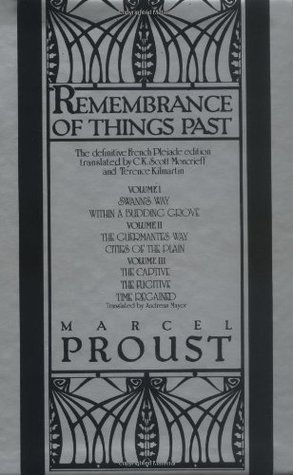What do you think?
Rate this book


3365 pages, Paperback
Published August 12, 1982
...with [my book's] help I would furnish [my readers] with the means of reading what lay inside themselves. So that I should not ask them to praise me or to censure me, but simply to tell me whether "it really is like that," I should ask them whether the words that they read within themselves are the same as those that I have written (though a discrepancy in this respect need not always be the consequence of an error on my part, since the explanation could also be that the reader had eyes for which my book was not a suitable instrument). [emphasis mine]On the sane basis of that method of assessing a book's value, i give Proust a "meager" 4 stars for his Herculean and fully laudatory efforts because in enough ways it "was not a suitable instrument" for my particular eyes.